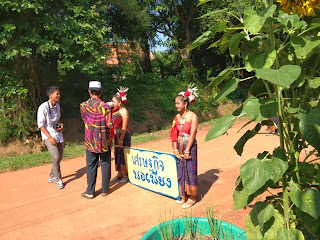Water and Rockets
Two Spring Festivals
One of the ways to experience Thailand’s rich cultural
heritage is through its festivals. This post looks at two spring festivals that
are celebrated all over Thailand, but may look rather different depending on
the part of the country you are in. My information is based mostly on how I
experienced the festivals here, in a small village (3,000 people) in
northeastern Thailand.
The Songkran festival takes place in mid-April, the hottest
time of the year, toward the end of the dry season. It dates back to an earlier
lunar calendar that had the New Year start in spring rather than the middle of
winter. This year, the actual holiday (April 13th) fell on a
weekend, so the next working day was declared an additional holiday and
Songkran lasted for five days, April 12-16, 2013. The long weekend gives
families time to get together for fun, relaxation, and rituals. Many people visit
the local temple to make merit. In earlier times, an important part of the
celebration was the water blessing, i.e., pouring water over the hands and feet
of loved ones, especially one’s elders, to wish them good luck, good health, long
life, and so on. The water is often scented with flower petals, as you see in the image below. Members of my host
family poured water on the hands and feet of relatives who had come from a
distance to visit them, and I was included in the ritual as well.
Unlike Songkran, the Rocket Festival or bang fai does’t have a fixed date. It is celebrated in late May,
just before the start of the rainy season; the date is set locally. The word fai means fire or light; bang refers to the cylinder (traditionally
made of bamboo) to hold the powder that is ignited to launch the rocket. The
festival goes back to a pre-medieval practice that my host family told me was
about bringing rain. In our village, the festival began with a parade that
passed our house at about 9:30am, on its way to the rocket-launching site. Everyone
who is anyone – the village headman, the vice-principal of our school, other
community leaders – was part of the parade. There were parade-marchers in
traditional Thai costumes, some in ordinary clothes, several women wearing
strings of wooden phalluses, and quite a few men wearing skirts. How the
gender-bending aspects of the celebration are connected to the bringing of rain
and fertility is unclear to me, but there they are. One man who stopped to chat with my host
family during the parade grabbed a skirt and wrapped it around himself before
leaving to watch the rocket launches.
The rocket launcher was erected on the grounds where our
weekly market is held. Rockets were shot
up at irregular intervals. The men setting up and firing off the rockets took
their time, which is doubtless a good thing-- the rockets use black powder so
can be quite dangerous.
As for watching the launches and the rockets’ vapor trail, I’m
sure it was very interesting to spectators who knew the rockets’ owners and
could track which rocket had gone the farthest. That part was over my head,
literally and figuratively. Besides the rocket launches, there were snack
stalls, a band with cross-dressing dancers, a few people dancing, and a lot of
people drinking beer. It was a brutally
hot day. I left after getting drizzled with beer that someone threw onto the
awning I was standing under.
The Thai Tourism Authority publicizes bang fai festivals in various cities in Thailand and in neighboring
Laos. I don’t know if the parades in those locations look like the one in our
village but I doubt it. The festival here is for the village, not for tourists,
and as such, is perhaps more authentic than festivals you would see in larger
cities. Which I suppose is just to say that when you’ve seen one, you haven’t seen
them all.






No comments:
Post a Comment